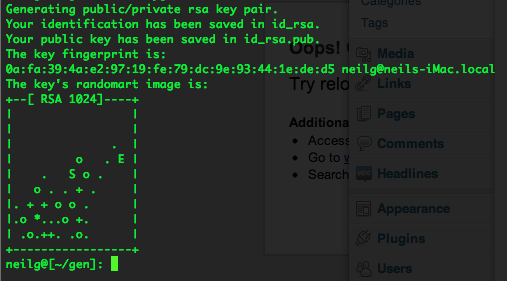Crypto Key Generate Rsa 1024 Command
Telnet versus SSH
- Crypto Key Generate Rsa 1024
- Crypto Key Generate Rsa Modulus 1024 Command
- Crypto Key Generate Rsa Command
- Generate A Rsa Crypto Key
- Cisco Generate Crypto Key
Many people continue to use Telnet for sensitive applications or access to critical systems. Telnet is CLEARTEXT, so all the data, including the login id is visible is someone intercepts that session
Here’s what this looks like using Wireshark an Open Source Protocol Analyzer when we use the Follow TCP Stream feature in Wireshark.
The next characters are red (the character I typed) and blue (the characters echoed back)
I guess the other option is to go Tools - Command Line Interface. And issue the command: 'crypto key generate rsa modulus 1024 noconfirm' View solution in original post. First, you must create the keys on both devices. We recommend using at least 1024-bit keys in production networks: Router1#configure terminal Enter configuration commands, one per line. End with CNTL/Z. Router1(config)#crypto key generate rsa The name for the keys will be: Router1.oreilly.com Choose the size of the key modulus in the range of 360 to 2048 for your General Purpose Keys. Oct 02, 2015 SSH Config and crypto key generate RSA command. Use this command to generate RSA key pairs for your Cisco device (such as a router). Keys are generated in pairs–one public RSA key and one private RSA key. If your router already has RSA keys when you issue this command, you will be warned and prompted to replace the existing keys with new keys. The first thing we have to do is generate the public and private keys.We first generate the private key. To do so, use the following command: openssl genrsa -out privatekey.pem 1024. The above command instructs OpenSSL to use RSA to generate a private key with a size of 1024 bytes. The key is then stored securely within a file called 'private.
You clearly see the User Verification Prompt.Here's the telnet trace file.
- The label is important, I'll tell you! In a minute why C1801(config)# crypto key generate rsa modulus 1024 label C1801 The name for the keys will be: C1801% The key modulus size is 1024 bits% Generating 1024 bit RSA keys, keys will be non-exportable.OK C1801(config)#.Jan 6 15:22:25.339:%SSH-5-ENABLED: SSH 1.99 has been enabled!
- Oct 02, 2015 SSH Config and crypto key generate RSA command. Use this command to generate RSA key pairs for your Cisco device (such as a router). Keys are generated in pairs–one public RSA key and one private RSA key. If your router already has RSA keys when you issue this command, you will be warned and prompted to replace the existing keys with new keys.
- Feb 17, 2018 Router(config)# crypto key generate rsa general-keys The name for the keys will be: myrouter.example.com Choose the size of the key modulus in the range of 360 to 2048 for your General Purpose Keys. Choosing a key modulus greater than 512 may take a few minutes.
Below you can see me typing in my username;
In this screenshot below you can see me entering the commandenable and the the enable password.
How to Enable SSH Version 1 on Cisco
Before you can enable SSH you need to assign individual (or group) user IDs and passwords.
These are just login id's and are required regardless if you use Telnet or SSH.
To enable locally administered user IDs, use the following set of configuration commands. I would not suggest using the nopassword parameter.

Crypto Key Generate Rsa 1024
Put your own data in the italized text.
Now when you telnet into the device you should see the Username prompt
| User Access Verification Username: fortunato Password: foghorn> |
Now that you have login id's created you can turn on SSH version 1.
To enable SSH, use the following set of configuration commands. I would not suggest using the nopassword parameter.
Put your own data in the italized text.
foghorn#configure terminal Enter configuration commands, one per line. End with CNTL/Z. foghorn(config)#crypto key generate rsa % Please define a domain-name first.! common mistake when you do not the IP domain-name created foghorn(config)#ip domain-name thetechfirm.com foghorn(config)#crypto key generate rsa The name for the keys will be: foghorn.thetechfirm.com Choose the size of the key modulus in the range of 360 to 2048 for your General Purpose Keys. Choosing a key modulus greater than 512 may take a few minutes. How many bits in the modulus [512]: 1024 % Generating 1024 bit RSA keys ..[OK] foghorn(config)#ip ssh time-out 120 foghorn(config)#ip ssh authentication-retries 5 foghorn(config)#end |
Crypto Key Generate Rsa Modulus 1024 Command
Now we'll try to capture the SSH login and as you can see the login data is no longer in clear text. Here's the SSH 1 trace file.
The moral of the story is not to use Cleartext logins if the device or application is sensitive.
To upgrade to even more secure SSH version 2, type in the following commands
Crypto Key Generate Rsa Command
| foghorn(config)#ip ssh version 2 foghorn(config)#no ip ssh version 1 foghorn(config)#end |
the SSH version 2 trace files are here
Generate A Rsa Crypto Key
In this write up I used;
Cisco Generate Crypto Key
Wireshark Protocol Analyzer(free)
Putty Telnet/SSH Client(free)
Cisco Switch(not free)
